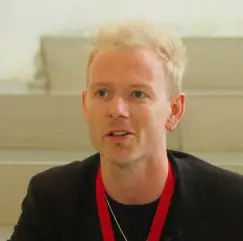10th October 2020
On World Mental Health Day (#WorldMentalHealthDay), a Voices blog by Dr Ranjana Das and Dr Paul Hodkinson from the University of Surrey about a new partnership between the University of Surrey, the Institute of Health Visiting and the National Childbirth Trust.

Dr Ranjana Das

Dr Paul Hodkinson
We are delighted to be writing here about a new partnership between ourselves at the University of Surrey, and the Institute of Health Visiting (iHV) and the National Childbirth Trust (NCT), where research findings on maternal and paternal perinatal mental health will be translated into resources for perinatal support. We have been researching and writing about perinatal wellbeing for the last few years. Ranjana’s work on mothers’ perinatal wellbeing and the role of digital technologies led her to approach Paul – who had been working with Rachel Brooks on fathers and fatherhood – to do joint work on new fathers’ perinatal mental health. We now are bringing these interests together, by producing parent and professional-facing resources in association with the Institute of Health Visiting and the National Childbirth Trust. This project is funded by an Impact Acceleration Award from the Economic and Social Research Council.
Key concepts from our research
As we recently outlined in our talk to the iHV London Forum in September 2020, our work on maternal and paternal mental health (publications available here) has thrown up key findings which will be foundational to the work we do on this next step. Ranjana’s work on maternal perinatal mental health and digital media led her to speak of the perinatal ideal – encompassing a range of societal pressures (theorised excellently by scholars within feminist sociology) which burden women in a range of increasingly digitally-mediated ways to go through the perinatal period under intensive pressures around pregnancy, birthing, feeding, weaning, sleeping and so on. The perinatal ideal, Ranjana argued, is maintained through media and social media representations, but such pressures are less visible in discussions on maternal anxiety or depression which are often understood through solely clinical, individualised lenses. Paul and Ranjana’s work on fathers’ perinatal mental health considered how the peripheral positioning of fathers as stoic, rock-like supporters, amidst minimal preparation and support, led many to position their own difficulties as invalid and unworthy of support. As a consequence, many had sought to brush their difficulties aside amidst what Ranjana and Paul called repertoires of illegitimacy. Both Ranjana and Paul have been considering the implications of these notions in their recent thinking around the impacts of COVID19 on maternal and paternal perinatal mental health.
Our new project
Perinatal mental health difficulties are increasingly recognised as a significant threat to the wellbeing of such fathers and mothers, as well as having significant implications for their families and children (iHV). Our new partnership with the iHV and NCT tackles both these needs by a) producing resources for parent communities gleaning insights from recent Surrey research and b) contributing to the awareness and training of healthcare professionals in the area of perinatal mental health by translating research findings for practitioner communities. Our proposed activities centre, amongst other things, on conducting evidence reviews of focused, specialist topics in perinatal mental health (with the NCT) and the production of on and offline information resources for parents (with the iHV). The development of these iHV resources will be collaborative, via parent and practitioner forums centred on highlighting where needs are greatest and identifying effective forms of content and delivery. Please visit our website to find out more about this new partnership: www.surreyperinatal.net.
And finally…… our public event Becoming a Parent in a Pandemic; 11 November 2020
We are focusing some of our broader work in the area on the specific challenges brought on by the COVID19 pandemic. This will form part of our broader work with the iHV but we are also hosting a free, virtual, public event on 11 November called Becoming a parent in a pandemic as part of the ESRC Festival of Social Science, bringing together practitioners, social scientists and members of the public, on the challenges and support needs of those who became parents amidst the COVID-19 pandemic. The event aims to reflect the unique and specific impacts that new mothers and fathers had to cope with, as birthing, postnatal and antenatal support, and wider social support all changed dramatically in 2020, amidst the threat of a virus and a global lockdown. Speakers will include new parents of 2020 and those from the NCT, the iHV, PND and Me, ROSHNI2, the Fatherhood Institute, Bournemouth University and of course us at the University of Surrey. The link to sign-up to attend this free event virtually is here, please do join us!
We look forward to engaging with you about our new partnership, our research , our event, and more, so please visit our website www.surreyperinatal.net, and to write to Ranjana ([email protected]) and Paul ([email protected]) at any time!

